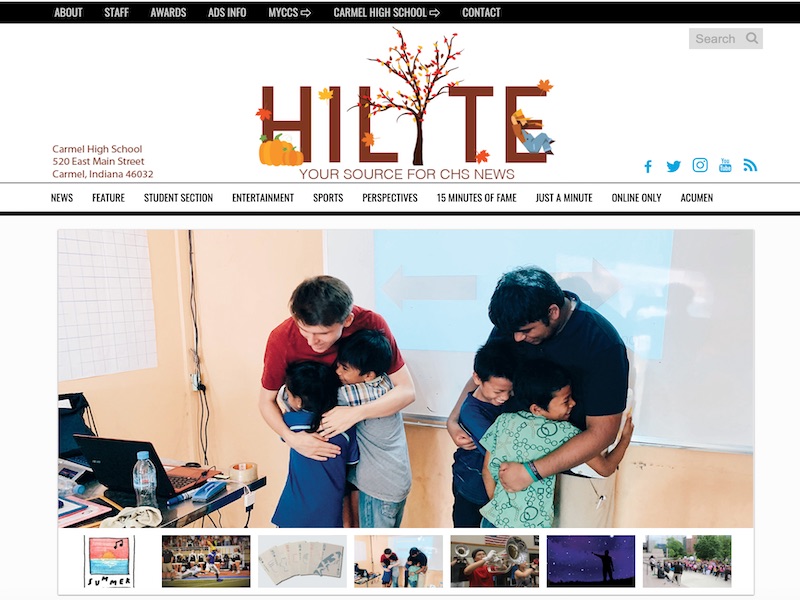8 Easy Facts About News Websites Described
Table of ContentsNews Websites Can Be Fun For EveryoneNews Websites - TruthsThe Greatest Guide To News WebsitesHow News Websites can Save You Time, Stress, and Money.The smart Trick of News Websites That Nobody is Talking About
It was down in the UK and Brazil but up a few other nations, such as Greece, Bulgaria, and Poland (News Websites). This year, for the first time, we inquired about the various manner ins which people stay clear of the news and found that around half of avoiders (53%) were attempting to do so in a broad-brush or periodic way for example, by switching off the radio when the information began, or by scrolling past the news in social media sitese.g. scrolling previous information, transforming networks when news begins. of avoiders check resources much less often. e.g. restriction to particular times of day, transforming off notifications, etc. of avoiders prevent some subjects. e.g. topics that bring down state of mind or boost anxiety. You stated that you try to proactively prevent news.

I'm probably choosing to learn more light-hearted stories than I made use of to at the moment. M, 51, UK Turning my back on news is the only way I feel I can cope in some cases. I need to knowingly make the initiative to avert for my own psychological health.
The Ultimate Guide To News Websites
Careful avoidance of Ukraine information was greatest in much of the countries closest to the problem, strengthening findings from our added survey last year, right after the war had started. Our data may not recommend a lack of rate of interest in Ukraine from nearby nations yet rather a desire to take care of time or secure psychological health from the extremely real horrors of war.
Contrasting Finland with a politically polarised nation such as the United States (see following chart) that is much less affected by the war, we locate a very different pattern of subject evasion. In the USA, we discover that consumers are more probable to avoid topics such as national politics and social justice, where discussions over concerns such as sex, sexuality, and race have actually become extremely politicised.
American national politics are rather toxic these days. I find occasionally that I have to detach from stories that just make me mad. F, 61, USA For some individuals, bitter and dissentious political debates are a factor to switch off news entirely, but also for some political partisans, avoidance is usually about shutting out viewpoints you do not intend to hear.

Not known Factual Statements About News Websites
Some are seeking to make information much more accessible for hard-to-reach groups, expanding the news program, commissioning more motivating or favorable information, or embracing useful or remedies journalism that give people a sense of hope or personal company. read this In our study this year, we asked participants about their rate of interest in these various strategies.
This describes why stories like Ukraine or nationwide politics perform well with information regulars but can at the exact same time transform less interested customers away (News Websites). Discerning avoiders are much less thinking about all sorts of news than non-avoiders but in family member terms they do appear to be extra thinking about favorable or solutions-based news

Some Known Questions About News Websites.
2023). This may be real in the moment, yet over time it seems to be leaving lots of people vacant and less pleased, which may be threatening our link with and rely on the news. Across markets, overall rely on news (40%) and count on the sources people use themselves (46%) are down by an even more 2 portion points this year.
Without a doubt, via the rear-view mirror, the COVID-19 trust fund bump is plainly noticeable in the following chart, though the direction of travel later on has been mixed. Sometimes (e.g. Finland), the trust boost has actually been preserved, while in others the upturn looks more like a blip in a tale of ongoing long-lasting decline.
Some of the highest possible reported degrees of media criticism are found in nations with highest possible levels of suspect, such as Greece, the Philippines, the United States, France, and the United Kingdom. The most affordable levels of media objection frequent those with greater levels of trust fund, such as Finland, Norway, Denmark, and Japan.
News Websites - An Overview
This year we asked participants about their preferences for message, sound and video when taking in information online. Usually, we locate that the bulk still choose to review the information (57%), instead of watch (30%) or pay attention to it (13%), yet more youthful people (under-35s) are a lot more most likely to listen (17%) than older groups.
Behind the standards we find substantial and surprising country distinctions. In markets with a solid reading custom, such as Finland and the United Kingdom, around 8 in 10 still choose to review online news, however in India and Thailand, around four in 10 (40%) say they choose to enjoy information online, and in the Philippines that percentage is over half (52%).